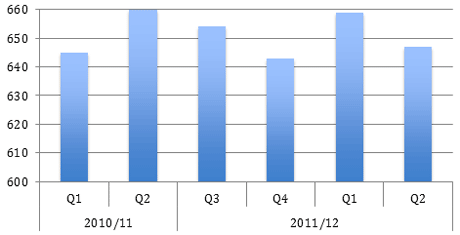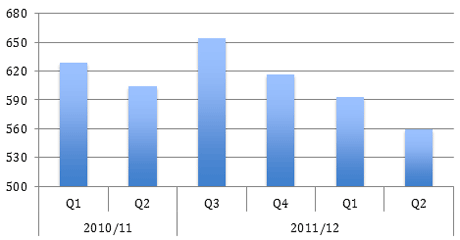Believe it or not, Apple is not a bubble stock
The public can't get enough of Apple's products, and the company's share price is soaring. Many analysts are calling it a bubble stock. But a closer look reveals it is far from overvalued, says Phil Oakley.
Get the latest financial news, insights and expert analysis from our award-winning MoneyWeek team, to help you understand what really matters when it comes to your finances.
You are now subscribed
Your newsletter sign-up was successful
Want to add more newsletters?

Twice daily
MoneyWeek
Get the latest financial news, insights and expert analysis from our award-winning MoneyWeek team, to help you understand what really matters when it comes to your finances.

Four times a week
Look After My Bills
Sign up to our free money-saving newsletter, filled with the latest news and expert advice to help you find the best tips and deals for managing your bills. Start saving today!
If Apple's latest quarterly results are anything to go by, consumers are still in love with the company it seems they just can't get enough of its products.
Sales of the iPhone smartphones, at 35.1 million units, were up 88% on a year ago. Sales of iPads (the tablet computers) were even more impressive, increasing by 151% to just under 12 million units.
In all, Apple's total sales grew by 58.7%, and net income virtually doubled. It ended the quarter with $110bn of cash.
MoneyWeek
Subscribe to MoneyWeek today and get your first six magazine issues absolutely FREE

Sign up to Money Morning
Don't miss the latest investment and personal finances news, market analysis, plus money-saving tips with our free twice-daily newsletter
Don't miss the latest investment and personal finances news, market analysis, plus money-saving tips with our free twice-daily newsletter
The obvious question is: can Apple keep delivering? Investors seem to have their doubts.
How can I say this, when the share price is already up nearly 40% this year? Because the fact is that Apple's profits are not highly rated.
At last night's closing price of $560, Apple was valued at $522bn, putting it on 12.6 times 2012 forecast earnings. That's hardly a crazy, tech-boom-style multiple.
And in fact, this overstates Apple's valuation.
Apple has $110bn of cash that is earning next to nothing in interest. Strip this out, and Apple has a value of $412bn, whilst Wall Street analysts expect its net profits to be around $42bn. So in reality, Apple is trading on less than ten times expected earnings.
A company in virtually any other industry with Apple's profit performance would surely command a much richer valuation. So what is the market worried about?
Fortunes can change quickly in the technology sector
Investors are right to question the staying power of technology stocks. You only have to look at Blackberry maker Research in Motion or Nokia (which I analyse in detail in the forthcoming issue of MoneyWeek magazine) to see how fortunes can change very quickly.
But could Apple be different?
That's dangerous talk, as we all know. But Apple could have a sustainable advantage for a number of reasons.
Its iPhones and iPads have become must-have' cult products. Despite the best efforts of competitors, Apple is selling more products and making more money than the rest of them.
Have a look at the chart below.
iPhone revenue per unit ($)

This shows the amount of money received for each iPhone sold. As you can see, the iPhone (58% of Apple's sales) is not behaving like a normal technology product, where prices gradually fall.
Apple is managing to sell them to customers without having to cut prices too much. Yes, it has to offer more features, but with consumers lapping them up, you can begin to understand why Apple's profits continue to defy gravity.
Revenues from iPads are showing a bit more deflation, with income per unit 15% lower than last summer. But with Apple selling iPads in such large numbers it's not complaining too much at the moment.
iPad revenue per unit ($)

In short, it seems that Apple has built a brand that has significant pricing power. This might sound silly, but should we be looking at it in the same way as a Coca-Cola or a Gillette?
Certainly, Apple is so far defying the business school textbooks which say that high profits will get competed away by competition. If it can keep doing this, then Apple's shares could still be very cheap indeed.
So what could go wrong?
The obvious answer is that sales could stop growing. Apple is always under pressure to keep improving its products to keep its customers happy. There is always the risk that a competitor brings out an amazing product that causes consumers to dump Apple. But this does not look likely in the short term.
Some Wall Street analysts are worried that mobile phone companies will cut their subsidies on iPhones, making them more expensive for customers and forcing them to switch to other smartphones. This could happen, but it would be quite a brave step to take while the iPhone remains so popular.
While growth in Asian markets should still be good, common sense tells us that the rate of sales growth will have to slow down. But what about new products?
For many tech observers, the latest iPhones and iPads are "evolutionary rather than revolutionary". Yet sales growth remains stellar. If Apple was to launch a major new product perhaps an Apple TV? then who would bet against the Apple juggernaut continuing its upward march?
If Apple shares were trading in the stratosphere there'd be good grounds for caution. Yet, given that they are not, we think they still look cheap. Betting against them still looks like the wrong thing to do. BUY.
Get the latest financial news, insights and expert analysis from our award-winning MoneyWeek team, to help you understand what really matters when it comes to your finances.
Phil spent 13 years as an investment analyst for both stockbroking and fund management companies.
-
 Should you buy an active ETF?
Should you buy an active ETF?ETFs are often mischaracterised as passive products, but they can be a convenient way to add active management to your portfolio
-
 Power up your pension before 5 April – easy ways to save before the tax year end
Power up your pension before 5 April – easy ways to save before the tax year endWith the end of the tax year looming, pension savers currently have a window to review and maximise what’s going into their retirement funds – we look at how